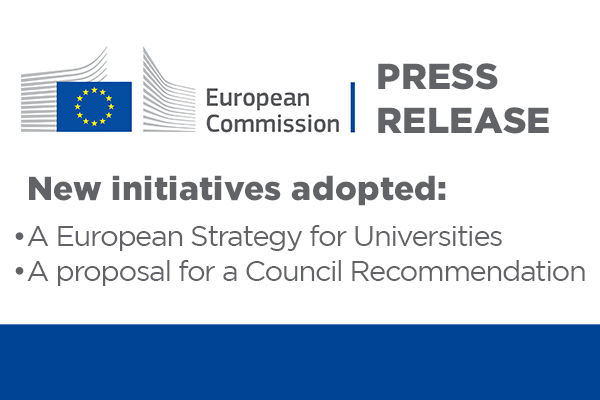The European Commission Presents the European Strategy for Universities with a Clear Commitment to the Growth of the European University Alliances
 In the face of the major challenges facing Europe, universities are uniquely positioned at the crossroads of education, research and innovation, in shaping sustainable and resilient economies. The two new initiatives adopted yesterday by the European Commission, a European strategy for universities and a Commission proposal for a Council Recommendation on building bridges for effective European Higher Education cooperation, will support universities in this endeavour by:
In the face of the major challenges facing Europe, universities are uniquely positioned at the crossroads of education, research and innovation, in shaping sustainable and resilient economies. The two new initiatives adopted yesterday by the European Commission, a European strategy for universities and a Commission proposal for a Council Recommendation on building bridges for effective European Higher Education cooperation, will support universities in this endeavour by:
- Strengthening the European dimension of higher education and research.
- Consolidating universities as lighthouses of our European way of life with supporting actions focusing on academic and research careers, quality and relevance for future-proof skills, diversity, inclusion, democratic practices, fundamental rights and academic values.
- Empowering universities as key actors of change in the twin green and digital transition.
- Reinforcing universities as drivers of EU's global role and leadership.
The strategy for universities will contribute to the European Education Area (EEA) by creating a new pathway towards joint European degrees; exploring a legal statute for European University Alliances and scaling up of the European Universities Initiative to 60 Alliances with 500 institutions in 2024.
On the other hand, the next agreed steps affecting the European Research Area (ERA) aim to develop reforms of academic careers and assessment systems in a way that other university missions can be reinforced. National level reforms and implementation of the Bologna process and European Higher Education Area (EHEA) instruments remains also crucial for transnational cooperation.
The European strategy for universities means, thus, “bringing transnational cooperation in Higher Education to a new level” as Margaritis Schinas, Vice-President for Promoting the European Way of Life, said. How these flagship initiatives will be implemented remains open to discussion and debate yet, but it will undoubtedly require “joining forces with the Member States and Higher Education institutions across Europe” (Mariya Gabriel, Commissioner for Innovation, Research, Culture, Education and Youth).
Arqus and the rest of the Alliances have a key role in making this European strategy for universities a reality by making European Universities of excellence and inclusiveness able to promote the European democratic values as well as sustainable development, entrepreneurship, integration and employment. Rectors of the Arqus universities have already adopted a joint position paper on a European strategy for universities, which tackles the four missions of Higher Education institutions (education, research, innovation, and service to society). In their last meeting at the Annual Conference 2021, rectors agreed that Arqus will continue to share our experiences both as individual institutions and as an Alliance and remain ready to contribute to the further development of the strategy and its future implementation.
Read the original news here.